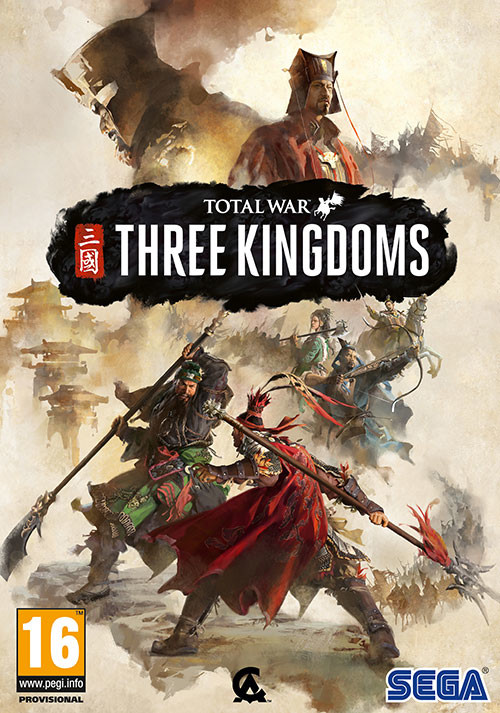Disclaimer: SEGA was kind enough to provide me with a copy to of Total War: Three Kingdoms for review. I mainly played Total War: Three Kingdoms in Romance Mode while preparing this review.
Total War: Three Kingdoms is the much-awaited 13th installment in the Total War series of video games. What is it about and how does it play? Let’s see!
Total War: A Quick Intro
Here is a quick intro for those of you who don’t know about the Total War Series developed by The Creative Assembly and published by Electronic Arts, Activision, and currently SEGA. The series started with Total War: Shogun, which is set in medieval Japan during the Sengoku Jidai, or Warring States, period. Subsequent installments are set in different historical periods, for example, Ancient Rome and medieval Europe, with Total War: Warhammer I and Total War: Warhammer II set in the fictional fantasy universe of Games Workshop’s Warhammer.
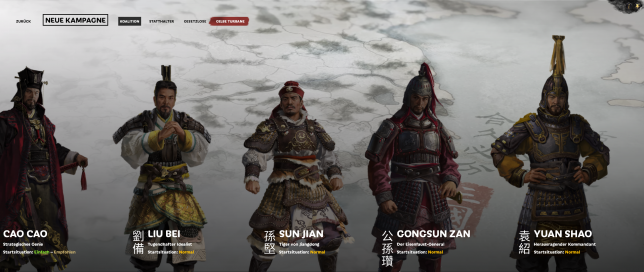
Players pick nations and get to control their chosen nations destiny. A unique feature of the Total War Series, that I haven’t seen implemented anywhere else, is a combination of turn-based strategy and real-time tactics. Players control their nations on a strategic level, manage cities, build armies, etc. But at the same time, once two opposing armies meet and a battle ensues, players have the option of controlling their armies on a tactical level.
The Setting
Three Kingdoms is set in China during the period of the, who would’ve guessed it, Three Kingdoms during the rule of the Han Dynasty, roughly around the year 190 AD. The Chinese emperor has no power, so several different kingdoms vie for power, influence, and ultimately the throne of the Chinese Empire.
The setting in China follows a trend that has established itself over the last few years: the inclusion of China and Chinese culture in media like comics, tv, cinema, and now video gaming. People slowly realize the size and importance of China (and the amount of money that can be made by including China into their projects) and are beginning to slowly turn this direction.
Is that bad? I don’t think so. I am thoroughly unfamiliar with China and this is the main challenge I face when playing Total War. Whereas it was easy with previous Total War titles (with the exception of Shogun for much the same reasons) to just jump in and get started, it is very hard with this one. The geography is unfamiliar, the important historical events and people that shaped these events are unfamiliar…hell, it is hard to even remember their names!
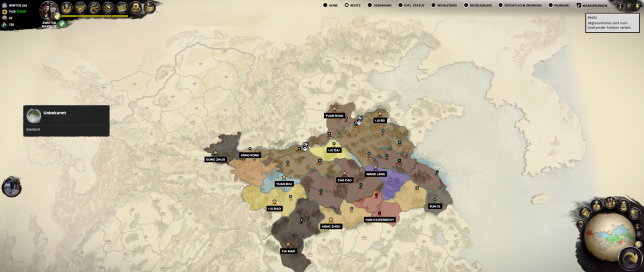
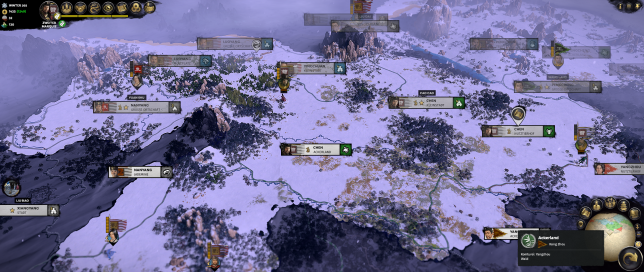
This is disturbing not because The Creative Assembly dared to make a game which has a historical setting I am unfamiliar with, but because I think it is symptomatic for Western countries (Europe and America, I am not sure about Australia and New Zealand). We are very much self-centered and focused on our own history and thoroughly ignore other societies, like those in Asia and Africa.
Unique Features
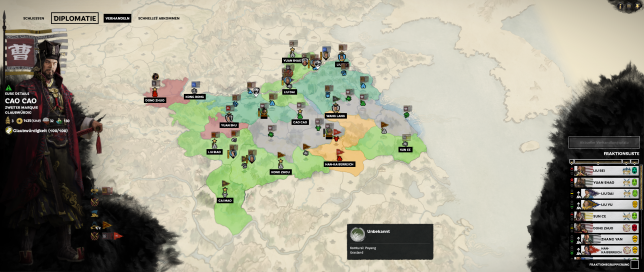
This is further compounded by the fact that Three Kingdoms has the most sophisticated system of diplomacy in any Total War game so far. The number of actors is baffling and the number of options as well. Trade relationships can be established, military access permitted or taken away, characters of different factions can be married to each other, adding new characters to your court or one of your characters to someone else’s court…and coalitions and alliances can be entered. This can quickly lead to quite complicated webs of diplomatic relations, and you have to be careful who you choose as your partner. Making the wrong decision can quickly drag you into a devastating war on several different fronts. Wars have to be carefully managed. The geography of China is vast, travel takes a long time, and historically armies and allies seldomly could support each other. Alliances were nice, but not very important, because the geography did not facilitate several allied armies fighting side by side. One drawback of Three Kingdoms is that the diplomacy screen does not help much in getting an overview of the different diplomatic relationships. I wish The Creative Assembly would’ve added more graphic features to the diplomacy screen that quickly visualize current diplomatic relationships.
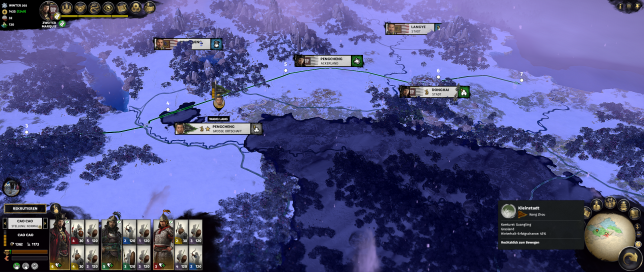
Another new feature is army replenishment. Three Kingdoms has a supply system implemented, by which armies have stocks. Armies use up their stocks whenever they are outside of friendly territory and lose combat effectiveness once they run out of supplies. Furthermore, being outside of friendly territory during winter greatly depletes stocks. Replenishing units that have lost soldiers also takes longer than in previous Total War titles. Armies have to wait this time out if they want to reach full strength, as it is not possible to consolidate two different units of the same type into one, and then recruit a new unit of the same type. You must wait. These features greatly enhance the historical accuracy of battles and movements. Now players are forced think which battles really have to be fought and which are better avoided, have to plan campaigns according to seasons and sometimes simply have to wait out the right time to go into battle. Sometimes, this can take many more turns as in past Total War titles, when you have to wait for your army to replenish, but now it is already summer and it will take your army three turns until you reach that city you want, meaning your army would have to spend winter outside of home territory, depleting combat effectiveness. Maybe it would be smarter to wait a few more turns until the weather is right.
What a great combination of mechanics!
This complex web of diplomatic relationships and logistical considerations is overlaid with another complex web of interpersonal relationships. Characters play a much bigger role in Three Kingdoms than in any previous Total War installations. They have motivations, loyalties, and relationships with other characters. Some characters get along very well, some don’t. It would be a mistake to put the latter into the same army. Some characters are good at making war, others are better at administration. You can send characters in your court to the court of other faction leaders to sow chaos, but you have to be sure of their loyalty. You wouldn’t want to end up with your former court member turning into a general for the other side, fighting against you.
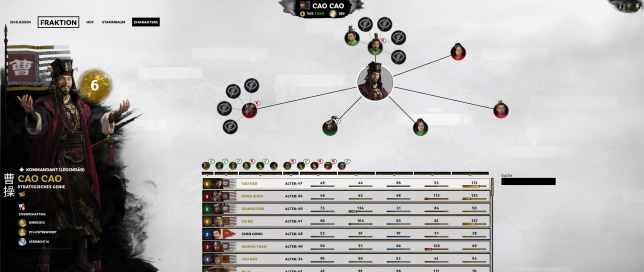
Characters, in fact, play such a big role in Three Kingdoms that they can decisively influence the outcome of battles. Players can choose two modes of play that are differentiated by how characters are treated: Records Mode, so called after the historical records of the period, which is more akin to other Total War titles in which characters are captains and generals with their own escorts and are treated as any other unit, and Romance Mode, inspired by the 17th century novel Romance of the Three Kingdoms. In Romance Mode, characters are powerful fighters who can quickly decimate other units if they are not opposed by other characters in battle. Two characters of opposing armies can face off in an epic duel, where the winner earns glory and the loser death. Romance Mode is a lot of fun to play and gives everything a Chinese Wuxia movie vibe.
Atmosphere
Total War: Three Kingdoms is beautifully designed. Everything looks like right out of an ancient Chinese artists mind. Graphics are superb, be it on the campaign or the tactical map. You get a good feeling of the geography of ancient China and battles look beautiful to watch on the tactical map.
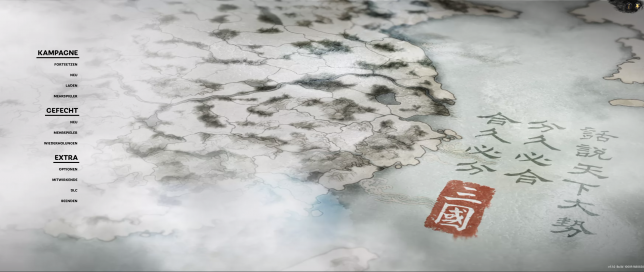
Everything else, be it music or the artwork or even the menu screen, looks beautiful and gives a feeling of being in a Chinese Wuxia movie playing during the time of the Three Kingdoms.
Conclusion
What can I say that I haven’t said already? If it has not become obvious yet: I love Total War: Three Kingdoms! It is not only a great game, but it helps me learn more about a culture and history that I have previously ignored.
I think Three Kingdoms is the most “strategic” Total War title. The interaction between the diplomacy, geography, and the way armies are recruited and sustained forces players to think and plan their actions several turns ahead. Whereas in Total War: Rome it was possible just to play round by round, invade here and there, see what happens, this is not so anymore. Players have to plan the order in which they want to construct buildings, their alliances and their expansion.
I also think it is the most beautiful title in the Total War series, even trumping Shogun II, with its beautiful artwork and graphics.
All in all, Total War: Three Kingdoms is the best Total War title so far and one of the best historical strategy/tactical games.
Highly recommended!
Did you have a chance to play Total War: Three Kingdoms? What did you think of it? Share your thoughts in the comments!
Disclaimer: All images courtesy of SEGA and The Creative Assembly.
